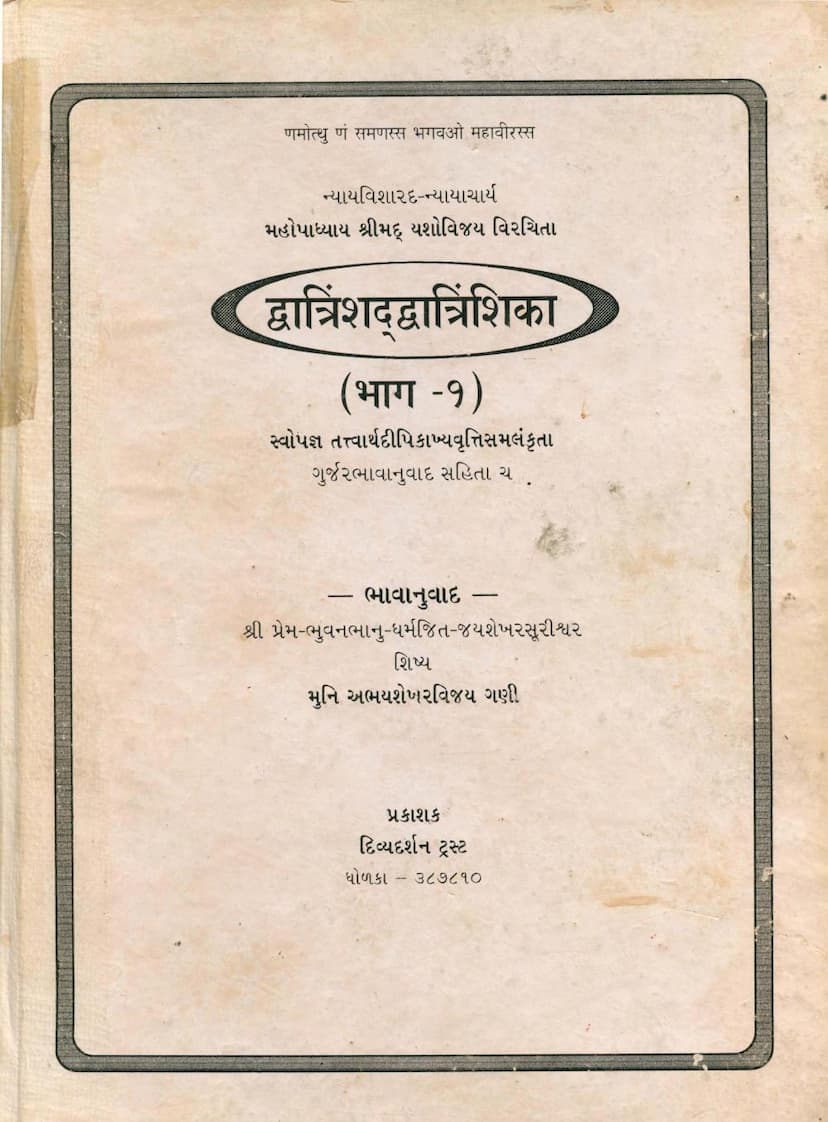Dwatrinshad Dwatrinshika Part 01
Added to library: September 1, 2025

Summary
This document is the first volume of "Dwatrinshad Dwatrinshika" by Mahopadhyay Yashovijayji, with a commentary called "Tattvarthadeepika" and a Gujarati translation by Muni Abhay Shekhar Vijay. It was published by Divyadarshan Trust.
Here's a summary of the content based on the provided pages:
Introduction and Publisher's Note (Pages 2-3):
- The book is a collection of 32 chapters (Dwatrinshikas), with this volume containing the first eight.
- It begins with a salutation to Lord Mahavir.
- The publication is dedicated to Acharya Bhagwant Shrimad Vijay Jay Shekhar Surishwarji, highlighting his spiritual achievements during his Chaturmas in Palitana.
- It mentions the support and inspiration received from various esteemed monks and patrons.
- The publisher, Divyadarshan Trust, expresses gratitude to the Santerav Jinenndra Bhuvan Trust for utilizing their knowledge fund for this publication.
Author's Intent and Textual Analysis (Pages 4-7):
- The author, Mahopadhyay Yashovijayji, is praised for his expertise in logic and his contribution to Jain philosophy through his works.
- The text "Dwatrinshikas" is described as a series of 32 chapters, each containing 32 original verses. A special feature is the word "Paramanand" appearing in the last verse of each chapter.
- The commentary, "Tattvarthadeepika," is noted for its varied approach, sometimes offering detailed explanations, sometimes brief, and at times merely referencing other works by the author (like Dharmapariksha, Syadvada Kalpalata, Upadesh Rahasya). In some cases, the commentary is omitted entirely, especially for the 32nd chapter.
- The author's method is described as drawing upon scriptures, the traditions of wise individuals, and his own insights, often synthesizing information from various texts like Ashtak, Shodashak, Yogadrishti Samucchaya, Yogabindu, and Patanjali Yoga Darshan.
- The text aims to shed light on various aspects of Jain philosophy, with the first volume covering the first eight Dwatrinshikas on topics like:
- Daan Dwatrinshika: On charity.
- Deshna Dwatrinshika: On sermons or teachings.
- Marg Dwatrinshika: On the path or conduct.
- Jin Mahattva Dwatrinshika: On the greatness of Jinas.
- Bhakti Dwatrinshika: On devotion.
- Sadhu Samagrya Dwatrinshika: On the qualities and conduct of monks.
- Dharmavyavastha Dwatrinshika: On the organization of Dharma.
- Vaad Dwatrinshika: On debate or logic.
- The translator-editor, Muni Abhay Shekhar Vijay, notes the challenges in translating the text, particularly in obscure passages, and expresses humility regarding his interpretations of the original author's intent. He thanks various scholars for their assistance.
Key Themes and Content of the First Eight Dwatrinshikas (as outlined in the table of contents): The table of contents provides a detailed breakdown of the specific topics covered in the first eight Dwatrinshikas, touching upon:
- Charity (Daan): Discusses various aspects of giving, including its efficacy, conditions, and relationship with compassion and devotion.
- Sermons (Deshna): Explores how to deliver teachings appropriately based on the listener's capacity, the nature of scripture, and the importance of wisdom.
- Path/Conduct (Marg): Addresses etiquette, proper conduct, the purpose of scriptural reasoning, avoiding self-created faults, the pitfalls of uncontrolled behavior, and the difference between various paths.
- Greatness of Jinas (Jin Mahattva): Examines the role of faith in generating virtue, the significance of consistent speech, the principles of causal action, and philosophical discussions on the creator and the nature of joy.
- Devotion (Bhakti): Delves into the necessity of virtue, the qualifications for building temples, and various forms of devotion to monks and Jinas.
- Monasticism (Sadhu Samagrya): Focuses on the different types of knowledge, the importance of discipline, the nature of alms, and the spiritual development of monks.
- Religious Order (Dharmavyavastha): Discusses purity of mind, the merits of various religious establishments, and the philosophical debates surrounding practices like meat-eating, alcohol consumption, and indulgence in worldly pleasures.
- Debate (Vaad): Explores different types of arguments, the principles of logic, and refutations of various philosophical viewpoints, including those of the Charvakas and Buddhists.
In essence, the first volume of "Dwatrinshad Dwatrinshika" is a profound exploration of Jain philosophy, ethics, and practice, presented through the structured verses of Mahopadhyay Yashovijayji and elucidated by Muni Abhay Shekhar Vijay. It aims to provide a comprehensive understanding of these topics, emphasizing the importance of correct understanding, virtuous conduct, and deep devotion for spiritual progress.